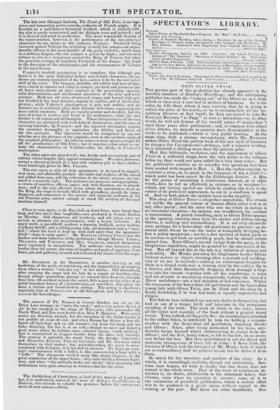The last new Olympic burletta, The Court of Old Fritz,
is an inge- nious and interesting petite comedy, evidently of French origin. It is founded on a well-known historical incident, which is cleverly told ; the plot is neatly constructed. and the dialogue terse and pointed ; and it is dressed and acted to perfection. The most remarkable feature of the representation, however, is the performance of the two principal characters by one actor—in this instance, FARREN. Frederick being incensed against Voltaire for criticizing severely his poems—an unpar- donable offence to the most humble of the genus irritabile, much more to a military despot—the wit escapes a prison by flight ; and not only refuses to join in a conspiracy against the King of Prussia, but takes the generous revenge of apprizing Frederick of his danger : this leads to the detection of the conspirators, and the reinstatement of Voltaire in the royal favour.
FARREN'S twofold personation is so complete, that although you know it is the same individual before you in both characters, the au- dience are scarcely reminded of the fact—unless it be by the unrivalled skill of the actor. The brusque, irritable, old soldier and man of busi• ness—harsh in manner and sharp in temper, yet kind and generous like all brave men—forms an utter contrast to the penetrating sagacity, calm determination, and intellectual adroitness of the wise and witty courtier. Both are old men, of wizened visage, and bowed with age ; but Frederick has hard features, angular in outline, and of florid com- plexion; while Voltaire's physiognomy is pale and mobile, and his features are in continual play, their delicate inflections expressing the most subtile emotions. Both are equally prompt and decided ; but the man of action is restless and hasty in his movements, while the cool thinker is all repose and deliberation. These idiosyneraeies of the two characters are portrayed with well•defined distinctness, and the ease of seeming habitude, by FARREN : and the repeated alternation enables the spectator thoroughly to appreciate the fidelity and finish of the two portraits. The likenesses would be recognized by any one who has seen the pictures of the originals, even to the sardonic smile of the sceptical philosopher. An inferior actor—a mere mimic—might hit off the peculiarities of Old Fritz ; but it requires a fine artist to em- body the characteristics of Voltaire—this, we think, is FARREN's masterpiece.
The other parts are played well; but, beside such an exquisite pair of cabinet whole-lengths, they appear commonplace. We must, however, except a charming sketch of a love• sick runaway girl in boy's clothes, most touchingly given by Mrs. FRANKS.
The one scene, a suite of state apartments, is designed in magnifi- cent taste, and admirably painted : the lights and shadows of the carved and gilded door.case, and the reflections in the mimic mirrors, are imi- tated in a masterly style. The costumes are gorgeous and appropriate : a swarm of courtiers, officers, pages, and state footmen, are in attend- ance; and in the very effective scene where the conspirators draw on the King, the stage is literally filled with grenadiers, guards du corps, dragoons, and cuirassiers, in the various and ungainly uniforms of the old Prussian army, correct enough to stand the scrutiny of the royal martinet himself.


























 Previous page
Previous page